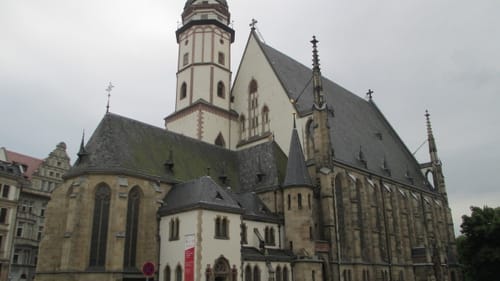Stay in the Loop
BSR publishes on a weekly schedule, with an email newsletter every Wednesday and Thursday morning. There’s no paywall, and subscribing is always free.
Deciphering Bach
Two concerts by Choral Arts' Bach@7

Was Bach a deeply devout Christian or a professional musician who wrote a lot of religious pieces because the churches were one of the major commissioning institutions? It’s a question that’s intrigued me since I first started thinking about the relationships between artists and the societies that support them. The lectures delivered at the latest Bach@7 concerts suggested we should check the box marked “both.”
The Bach Festival’s Bach@7 concerts are one-hour Wednesday night concerts that focus on the shelves of cantatas Bach wrote when he was music director of Leipzig’s St. Thomas Church. In previous seasons, Matthew Glandorf scheduled one cantata in each concert and performed it with other pieces—including modern works—that had something in common with the Bach offering.
Art and religion
This season Glandorf opts for a more scholarly approach. He’s presenting Bach’s 18 surviving cantatas written from 1734 to 1735, two per concert, with a lecture in the middle.
As St. Thomas’s music director, Bach was supposed to compose a cantata for every Sunday service. Each week he composed, rehearsed, and conducted a 20-minute religious piece that usually included arias, choruses, and instrumental music.
Artists, in my view, are primarily driven by the impulse to create, not the impulse to spread their religious and social ideas. In her book Two-Part Invention, author Madeleine L’Engle describes an attitude that's probably common among artists. “My mother and father were Episcopalians,” she writes, “but being a ‘Christian’ was secondary (if it was thought about at all) to being a good and faithful singer, painter, or writer.”
At the February 1, 2017, concert, Swarthmore’s Dr. Michael Marissen made it clear Bach was an artist who thought about his religion a bit more than L’Engle’s parents did. The interviews for the Leipzig job included a six-hour theological exam, and Bach’s personal library contained shelves of theological works. We know he actually read the books, Marissen said, because they contain comments in Bach’s handwriting.
Marissen argued that the music in Bach’s cantatas is a commentary on the text. If the text seems sad and the music sounds happy, there’s a religious reason. You can listen to a cantata just for the music, but you’ll understand it better if you understand its theology.
Art and commerce
At the February 8, 2017, concert, Temple University music history professor Dr. Stephen Zohn presented an entertaining lecture that looked at Bach’s professional side. Bach wrote five complete cantata cycles during the 27 years he worked in Leipzig, but they wouldn’t have covered a fifth of the Sundays he was there. He also performed cantatas by other composers and even had his sons write a few. As Zohn described it, church music directors filled in their schedules by trading cantatas with each other.
Whatever their religious convictions, Lutheran music directors must have felt they were stuck with a grinding weekly chore. At some point, perhaps Bach felt he’d exhausted the artistic possibilities of the liturgical year. Like any artist, he would have tried to lighten his obligations and increase the time he could devote to other work.

Zohn is also the series’ primary flutist. The wooden Baroque flute is one of the most challenging historical instruments a performer can play. Zohn plays it with a strong tone and expressive style that’s one of the Bach@7’s major pleasures. At the February 1 concert, his role in the first cantata was just as important as the role of the soloist, guest soprano Laura Heimes, who was in exceptionally good voice. Alto Robin Bier provided her with a worthy companion in the second cantata.
Art and pleasure
The February 8 concert would have appealed to anyone who likes music, whatever their theological likes or lacks. The first cantata was an Easter celebration, complete with a trumpet sounding over exuberant interactions between voices and instruments. The second cantata contained a classic example of the reason Bach continues to engage audiences: In the center of the performance area, tenor Stephen Ng and alto Marin Montalbano sang a duet in which they sometimes sang different words at the same time, in addition to different vocal lines. Meanwhile, Rebecca Harris played a violin part that could have stood by itself as a solo. Bach glorified his Creator by showering everything he wrote with his own irrepressible creativity.
I liked the previous Bach@7 format and hope Glandorf will return to it. The pieces by other composers added variety and introduced me to some modern religious composers I hadn’t encountered elsewhere. But the current season is thought-provoking and illuminating, and Glandorf maintains the festival’s musical standards.
What, When, Where
Bach as Religious Thinker. Bach, BWV 82, Ich habe genug (I Have Enough); BWV 125, Mit Fried und Freud ich fahr dahin (With Peace and Joy I Depart). Talk: "J.S. Bach as Religious Thinker." Laura Heimes, soprano; Robin Bier, alto; Nikolas Karageoriou, tenor; Ryan Tibbetts, bass; Dr. Michael Marissen, speaker; Choral Arts Philadelphia, chorus; Philadelphia Bach Collegium, orchestra; Matthew Glandorf, conductor. Bach@7. February 1, 2017, at St. Clement's Church, 2013 Appletree Street, Philadelphia.
Cantatas in the Bach circle. Bach, BWV 66, Erfreut euch, ihr Herzen (Rejoice Your Hearts); BWV 134, Ein Herz, dass seinen Jesum lebend weiss (A Heart Knows that Jesus Is Living). Jessica Beebe, Rebecca Myers, sopranos; Maren Montalbano, Jenifer L. Smith, altos; Stephen Ng, tenor; Jean Bernard Cerin, Robert Eisentrout, basses; Dr. Steven Zohn, speaker; Choral Arts Philadelphia, chorus; Philadelphia Bach Collegium, orchestra; Matthew Glandorf, conductor. Bach@7. February 8, 2017, at St. Clement's Church, 2013 Appletree Street, Philadelphia. (267) 240-2586 or choralarts.com.
Sign up for our newsletter
All of the week's new articles, all in one place. Sign up for the free weekly BSR newsletters, and don't miss a conversation.
 Tom Purdom
Tom Purdom